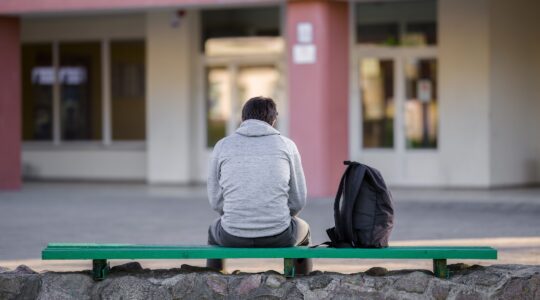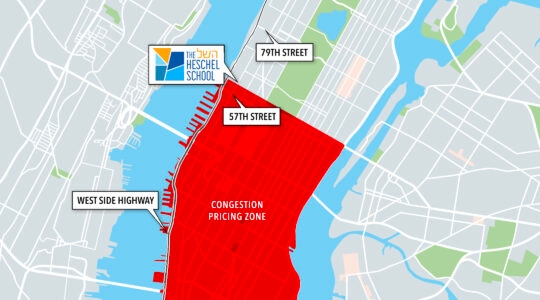Liberal and egalitarian prayer services have for years taken their cues from Ashkenazi liturgy and homegrown American tunes. But that is changing.
Bo-i Kallah, a Kabbalat Shabbat service enhanced with pan-Sephardic songs and poems, is the brainchild of Congregation B’nai Jeshurun’s Rabbi Rolando Matalon. Bo-i Kallah translates as “Come Bride,” a reference to the Shabbat Bride. It is a line from “Lecha Dodi,” which is sung during Friday evening prayers.
Each month since January, about 100 worshippers have been meeting in B’nai Jeshurun’s Community House on West 89th street for an early Friday-evening service — an offshoot of the unaffiliated synagogue’s main Friday night service that attracts roughly 500-800 attendees to its colorful sanctuary. The Reception Room in which Bo-i Kallah is held features a wood-paneled art deco interior with the original B’nai Jeshurun logo of the Lion of Judah and American eagle on the wall above the fireplace. The room, which does not have a bima, is arranged so that everyone is seated at the same level. Bo-i Kallah’s intimate setting allows participants to explore music and poems emanating from the Jewish communities of Turkey, Spain, Iraq, Morocco, Libya, Yemen, Syria and Egypt, as well as experience the dynamic found in Sephardic synagogues, which tends to be more interactive and participatory than that of Ashkenazi shuls.
“It’s an ongoing process for all who are involved, as Sephardic is a vast spectrum, and the melodies and rhythms of each community are so different,” said musician Dan Nadel, with whom Rabbi Matalon developed and leads the service.
This blend of Sephardic melodies and customs is called “Sefarad-Yerushalayim,” referring to the music tradition that emerged in Jerusalem in the 20th century; it reflected the spectrum of Sephardim who felt the need “to build bridges and mix tunes in order to attract a wider community and survive,” said Nadel.
The Bo-i Kallah service is accented with guitar, a popular instrument throughout the Sephardic world. What is especially noteworthy is its egalitarian nature. Since liberalism influenced European streams of Judaism, but did not reach North Africa or the Middle East, most Sephardic services are Orthodox. While Sephardic Orthodoxy tends to be more moderate than Ashkenazi Orthodoxy, seating remains separate, and the clergy is male. The Sephardic Jewish Center of Forest Hills, for example, has separate seating but no barrier, and a frequently used parking lot.
“There is a deep thirst, a yearning for it,” observed Nadel. “Other Sephardic minyanim don’t appeal to progressive Jews — they have separate seating, no female voices. I think we are able to bring something that is very rooted in tradition but appeals to people who may also come from different traditions and seek beautiful meaning and sound.”
Rabbi Matalon was inspired to start Bo-i Kallah in New York thanks to a renaissance he has witnessed in Israel, where Jews coming from around the world are exploring each other’s heritages. This speaks to the experience of Nadel, who is Ashkenazi: “Growing up in Israel, these sounds are always around you, no matter what your background, and I was always attracted to a sound that was more Eastern.”
As Rabbi Matalon sees it, it is the younger generation that is bringing change. “They see gender parity” in most aspects of their lives, and want to “see it reflected in the synagogue.”
Historically in Israel, “Sephardic cultures were suppressed, pushed down, considered to be of lesser importance and quality to European Jewish culture. The message was that they were inferior,” the rabbi said. “All of that is changing now. Sephardic and Oriental cultures are now taking their place.” Rabbi Matalon mentioned that it is not just in religious life, which has seen a newfound respect for non-Ashkenazi traditions, but it is also in the realms of food, song and other aspects of the arts.
Rabbi Matalon is a founding co-director of Piyut North America, a partnership between B’nai Jeshurun and Hazmanah Le-Piyut in Israel, which is archiving thousands of liturgical poems, called piyutim. The piyutim range from poems written many centuries ago to those composed in the contemporary era. According to the rabbi, the project aims to “bring the richness of Jewish tradition, including Sephardic poems of North African and Eastern Jewish provenance, to the attention of the largely Ashkenazi American Jewish community.” Rabbi Matalon introduced Nadel to piyutim, which Nadel has embraced alongside his passion for Spanish flamenco music.
Rabbi Matalon, who has been at the helm of B’nai Jeshurun since 1993, has long incorporated Sephardic tunes into Shabbat and High Holy Days services. Starting Bo-i Kallah as a breakaway service was a natural step for the rabbi, who wanted to provide a Sephardic alternative on a regular basis. Having grown up in South America in a family from Aleppo, Syria, and then going on to become one of the leading progressive rabbis in the United States, Rabbi Matalon’s unique background positions him well for the role of global Jewish ambassador. The rabbi said that he has “a strong calling for this,” referring to the liturgy he enjoyed as a child in Buenos Aires, Argentina.
Upper West Side artist Debra Howard enjoys the service on what she considers “a visceral level.”
“Bo-i Kallah with Rabbi Matalon is saying ‘Come, My Bride’ with a sort of promise that we are going to pay good attention to her.”
For consultant Scott Weiner, “the service has provided an opportunity to experience another gateway to prayer.”
Although Bo-i Kallah is a Sephardic service, it remains part of B’nai Jeshurun, whose membership is mostly Ashkenazi. While it is the only progressive Sephardic service in the city, Rabbi Matalon sees it not as an attempt to liberalize the Sephardic community, but to enhance what B’nai Jeshurun already has. “We live in a global community,” he noted. “I wanted to give people a sense of the richness of Jewish tradition and peoplehood.”
The New York Jewish Week brings you the stories behind the headlines, keeping you connected to Jewish life in New York. Help sustain the reporting you trust by donating today.




